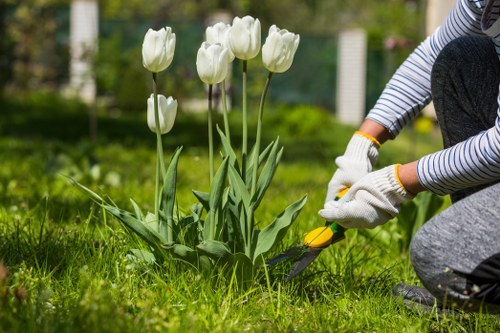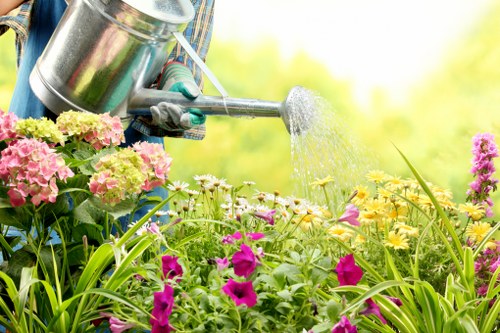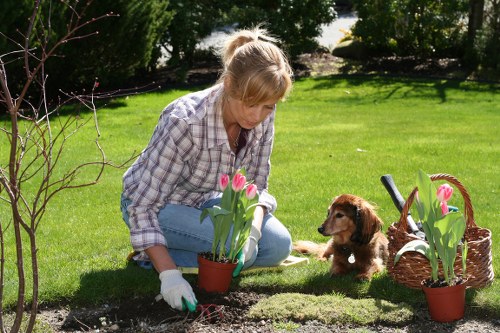Comprehensive Guide to Garden Maintenance in Highgate
Introduction to Garden Maintenance

Maintaining a beautiful garden in Highgate requires a blend of passion, knowledge, and regular care. Whether you are a seasoned gardener or a beginner, understanding the specific needs of your garden can transform it into a vibrant and thriving space.
Highgate's unique climate and soil conditions play a significant role in determining the types of plants that will flourish. Proper garden maintenance not only enhances the aesthetic appeal but also promotes the health and longevity of your plants.
In this article, we will explore the essential aspects of garden maintenance in Highgate, providing you with actionable tips and expert advice to keep your garden in top-notch condition.
Seasonal Garden Care

Different seasons bring different challenges and opportunities for your garden. Adapting your maintenance routine to the changing weather ensures that your plants receive the appropriate care they need throughout the year.
Spring Maintenance
Spring is a time of renewal, making it the perfect season to start fresh with your garden. Begin by clearing out any debris from the winter months and preparing the soil for new growth.
- Pruning: Trim back overgrown branches to promote healthy growth.
- Soil Testing: Check the pH levels and nutrient content to determine if any amendments are needed.
- Planting: Start sowing seeds or transplanting young plants to establish a strong foundation.
Essential Tools for Garden Maintenance

Having the right tools is crucial for effective garden maintenance. Investing in quality equipment can make tasks easier and more efficient, ultimately leading to better results.
Basic Gardening Tools
Every gardener should have a set of essential tools to handle various maintenance tasks.
- Hand Trowel: Ideal for digging small holes and transplanting seedlings.
- Pruners: Essential for trimming and shaping plants.
- Garden Hose: Provides a reliable source of water for your plants.
- Gloves: Protect your hands from thorns and dirt.
Soil Health and Fertilization

Healthy soil is the backbone of a flourishing garden. Proper soil management ensures that your plants receive the necessary nutrients and support for growth.
Soil Preparation
Before planting, it's important to prepare the soil by removing weeds and incorporating organic matter.
- Weed Control: Use mulch or natural weed killers to minimize unwanted growth.
- Composting: Add compost to enrich the soil with vital nutrients.
- Aeration: Improve soil structure by loosening compacted areas.
Fertilization Techniques
Applying the right fertilizer can significantly impact plant health. Choose a fertilizer that matches the specific needs of your garden plants.
Pest and Disease Management

Protecting your garden from pests and diseases is essential for maintaining plant health. Early detection and effective management strategies can prevent significant damage.
Identifying Common Pests
Highgate gardens may attract a variety of pests that can harm your plants. Identifying these pests is the first step in controlling them.
- Aphids: Small insects that suck sap from plants.
- Slugs: Mollusks that feed on leaves and stems.
- Spider Mites: Tiny arachnids that cause discoloration of leaves.
Effective Disease Prevention
Diseases can spread quickly in a garden if not addressed promptly. Implementing preventive measures can reduce the risk of outbreaks.
- Proper Spacing: Ensure adequate airflow between plants to prevent fungal growth.
- Sanitation: Remove and dispose of infected plant material immediately.
- Resistant Varieties: Choose plant varieties that are resistant to common diseases.
Watering Strategies for Highgate Gardens
Water management is a critical component of garden maintenance. Efficient watering practices ensure that plants receive the right amount of moisture without overwatering.
Optimal Watering Techniques
Adopting proper watering techniques can enhance plant health and conserve water.
- Drip Irrigation: Provides targeted watering directly to the plant roots.
- Mulching: Reduces water evaporation and maintains soil moisture.
- Timing: Water early in the morning to minimize evaporation and allow plants to dry before nightfall.
Water Conservation Tips
Implementing water-saving measures not only benefits your garden but also promotes environmental sustainability.
- Rainwater Harvesting: Collect and store rainwater for garden use.
- Drought-Resistant Plants: Incorporate plants that require minimal watering.
- Soil Amendments: Improve soil's water retention capacity with organic matter.
By following these watering strategies, your Highgate garden will thrive, even during dry periods. Contact us today to learn more about our personalized garden maintenance services tailored to your specific needs.
Lawn Care and Maintenance
A well-maintained lawn can significantly enhance the overall appearance of your garden. Regular lawn care practices contribute to the health and vibrancy of your outdoor space.
Mowing Techniques
Proper mowing is essential for maintaining a healthy lawn. Here are some tips to achieve the best results:
- Cut at the Right Height: Keep the grass at an optimal height to encourage strong root growth.
- Sharp Blades: Ensure your mower blades are sharp to make clean cuts.
- Mowing Frequency: Adjust mowing frequency based on grass growth rates.
Fertilizing Your Lawn
Fertilization provides essential nutrients that promote lush and green grass. Choose a fertilizer that matches your lawn's specific requirements.
- Nitrogen-Rich Fertilizers: Encourage rapid growth and deep green color.
- Phosphorus and Potassium: Support root development and overall plant health.
- Organic Options: Use compost or natural fertilizers for environmentally friendly choices.
Weed and Pest Control
Maintaining a weed-free lawn is crucial for its health and appearance. Implementing effective weed and pest control measures ensures a pristine and resilient lawn.
Regular lawn care combined with professional assistance can keep your garden in Highgate looking its best all year round. Book your service now to enjoy a beautifully maintained lawn without the hassle.
Pruning and Trimming
Pruning and trimming are vital practices for shaping plants and promoting healthy growth. Proper techniques can prevent diseases and enhance the aesthetic appeal of your garden.
When to Prune
Timing is crucial when it comes to pruning. Different plants require pruning at specific times to ensure optimal growth.
- Spring-Flowering Plants: Prune immediately after blooming.
- Summer-Flowering Plants: Prune in late winter or early spring.
- Trees and Shrubs: Regular trimming during the growing season maintains shape and removes dead branches.
Pruning Techniques
Using the right techniques can make pruning more effective and less stressful for the plants.
- Clean Cuts: Use sharp tools to make clean cuts, reducing the risk of disease.
- Angle of Cut: Cut at a slight angle to prevent water accumulation and rot.
- Remove Weak Branches: Focus on removing weak or overcrowded branches to improve air circulation.
Tools for Pruning
Having the appropriate tools ensures that pruning is done efficiently and safely.
Investing in quality pruning tools can make a significant difference in the health and appearance of your garden. Contact us today to schedule a pruning session with our expert gardeners.
Mulching for Garden Health
Mulching is a simple yet effective way to improve your garden's health and appearance. It offers numerous benefits that contribute to a thriving outdoor space.
Benefits of Mulching
Applying mulch to your garden has several advantages:
- Weed Suppression: Mulch blocks sunlight, preventing weed growth.
- Moisture Retention: Helps retain soil moisture, reducing the need for frequent watering.
- Temperature Regulation: Keeps soil temperatures stable, protecting plant roots from extreme heat or cold.
Types of Mulch
Choosing the right type of mulch depends on your garden's specific needs and aesthetic preferences.
- Organic Mulch: Includes materials like bark, straw, and compost. Enhances soil fertility as it decomposes.
- Inorganic Mulch: Comprises gravel, rubber, and landscape fabric. Provides long-lasting weed control without decomposing.
- Colorful Mulch: Adds a decorative element to your garden with options like dyed bark or colored stones.
Application Tips
Proper application of mulch ensures maximum benefits:
- Depth: Apply mulch in a layer 2-3 inches thick.
- Placement: Keep mulch a few inches away from plant stems and tree trunks to prevent rot.
- Maintenance: Replenish mulch as needed to maintain its effectiveness.
Implementing effective mulching strategies can lead to a healthier and more attractive garden. Book your service now to have our team assist you in selecting and applying the perfect mulch for your Highgate garden.
Plant Selection and Diversity
Selecting the right plants is fundamental to successful garden maintenance. A diverse plant palette not only enhances beauty but also promotes a balanced ecosystem.
Choosing Native Plants
Native plants are well-suited to the local climate and soil conditions, making them easier to maintain and more resistant to pests and diseases.
- Adapted to Local Conditions: Thrive with minimal intervention.
- Support Local Wildlife: Provide habitat and food for native insects and birds.
- Lower Maintenance: Require less water and fertilizer compared to non-native species.
Incorporating Perennials and Annuals
A mix of perennials and annuals adds variety and ensures year-round interest in your garden.
- Perennials: Provide long-term structure and bloom each year.
- Annuals: Offer vibrant, seasonal color and fill in gaps between perennials.
- Succession Planting: Stagger planting times to maintain continuous blooms.
Creating a Planting Plan
A well-thought-out planting plan helps in organizing plant placement for optimal growth and aesthetic appeal.
Collaborating with our gardening experts can assist you in developing a diverse and resilient planting plan. Contact us today to start transforming your Highgate garden with a customized plant selection.
Irrigation Systems and Efficiency
Efficient irrigation systems are essential for maintaining a healthy garden, especially in areas prone to water scarcity.
Types of Irrigation Systems
Choosing the right irrigation system depends on your garden's size, plant types, and water availability.
- Drip Irrigation: Delivers water directly to the plant roots, minimizing evaporation.
- Sprinkler Systems: Suitable for larger areas but can be less efficient due to water loss.
- Soaker Hoses: Provide a steady drip of water along their length, ideal for garden beds and borders.
Enhancing Water Efficiency
Maximizing water efficiency not only conserves resources but also ensures that your plants receive adequate hydration.
- Smart Controllers: Automate watering schedules based on weather conditions.
- Rain Sensors: Adjust watering times in response to rainfall, preventing overwatering.
- Leak Detection: Identify and repair leaks promptly to avoid water wastage.
Maintenance of Irrigation Systems
Regular maintenance of irrigation systems ensures their longevity and proper functionality.
Our team can help you design, install, and maintain an efficient irrigation system tailored to your Highgate garden. Book your service now to optimize your garden's watering needs.
Composting and Soil Enrichment
Composting is an eco-friendly way to recycle organic waste and enrich your garden soil with essential nutrients.
Benefits of Composting
Incorporating compost into your garden maintenance routine offers multiple advantages:
- Improves Soil Structure: Enhances soil aeration and drainage.
- Increases Nutrient Content: Provides a rich source of nutrients for plants.
- Promotes Microbial Activity: Supports beneficial soil organisms that aid in plant growth.
How to Start Composting
Starting a compost pile is straightforward with the right guidance and materials.
- Select a Location: Choose a shaded area with good ventilation.
- Gather Materials: Combine green materials like kitchen scraps with brown materials like dry leaves.
- Maintain the Pile: Turn the compost regularly to aerate and speed up decomposition.
Using Compost in Your Garden
Once the compost is ready, it can be used to enhance various parts of your garden.
Embrace the benefits of composting to foster a sustainable and fertile garden environment. Contact us today to learn more about integrating composting into your garden maintenance routine.
Conclusion and Next Steps
Effective garden maintenance in Highgate involves a comprehensive approach that addresses soil health, plant care, pest management, and efficient resource use. By implementing the strategies outlined in this article, you can ensure that your garden remains a beautiful and thriving sanctuary.
Partnering with Professionals
While DIY garden maintenance is fulfilling, partnering with professional gardeners can elevate the health and aesthetics of your garden. Experts bring valuable knowledge, experience, and resources to tackle complex maintenance tasks.
Get Started Today
Ready to transform your Highgate garden? Our team of gardening professionals is here to assist you with personalized maintenance plans tailored to your unique needs.
Book your service now and take the first step towards a vibrant and well-maintained garden that you can enjoy all year round.